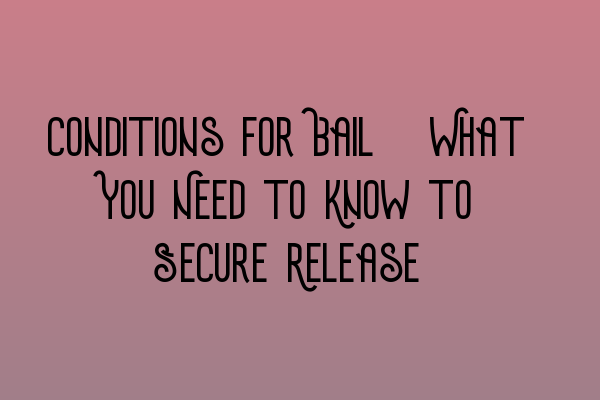Conditions for Bail: What You Need to Know to Secure Release
When charged with a criminal offense, one of the most concerning aspects is the possibility of being remanded in custody until the trial. However, it’s important to understand that there are several conditions for bail that can help you secure your release.
Understanding Bail
Bail is a legal process that allows an individual accused of a crime to be released from custody while awaiting trial. This provides them with the opportunity to prepare a solid defense and continue their regular life until the court hearing.
To secure bail, it’s essential to demonstrate that you’re not a flight risk and that you’re unlikely to commit further offenses or interfere with the investigation. The court takes several factors into consideration when deciding whether to grant bail or not.
Conditions for Bail
To increase your chances of being granted bail, you need to be willing to comply with certain conditions imposed by the court. These conditions are aimed at ensuring your appearance in court and maintaining public safety. Some common conditions include:
- Residential: You may be required to provide an address where you will reside while on bail. This address needs to be approved by the court and must remain the same throughout the duration of the case.
- Reporting: Regularly reporting to a police station or designated officer can be a condition for bail. This allows the authorities to monitor your compliance with the bail terms.
- Curfew: The court may impose a curfew to ensure you stay at home during specified hours. This is often done to prevent potential offenses during nighttime.
- Electronic Monitoring: In some cases, you may be required to wear an electronic tag or ankle monitor, allowing the authorities to track your movements.
- Surrender of Passport: If you’re considered a flight risk, you may be required to surrender your passport to prevent you from leaving the country.
- Non-Contact Order: If the alleged offense involves a victim or a witness, the court may order you to have no contact with them to ensure their safety and the integrity of the investigation.
It’s important to note that failure to comply with any of the conditions for bail can result in your bail being revoked, leading to your immediate re-arrest and detention until the trial.
Seek Professional Legal Advice
Navigating the complexities of bail conditions can be challenging, especially when you’re dealing with a criminal charge. To ensure you understand your rights and obligations, it is advisable to seek professional legal advice as early as possible.
At SQE Criminal Law & Practice Law UK, we have a team of experienced solicitors who specialize in criminal law and can provide you with the guidance you need. Contact us today for a consultation and let us help you secure your release.
Related Articles:
For further information on related topics, please refer to the following articles:
- SQE 1 Practice Exam Questions
- SQE 1 Practice Mocks FLK1 FLK2
- SQE 2 Preparation Courses
- SQE 1 Preparation Courses
- SRA SQE Exam Dates
